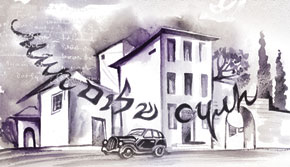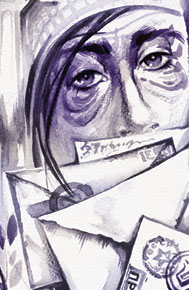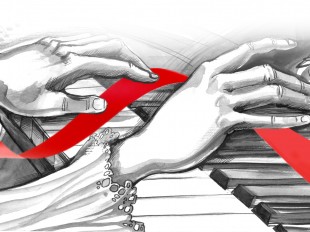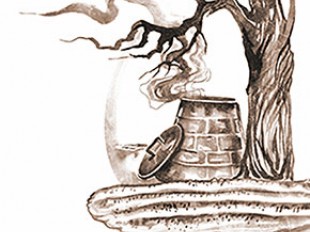You never came to Baku in the 50s? Then you won’t have experienced the atmosphere of eternal carnival that reigned in that southern city. We all knew the most beautiful women by name and marvelled whenever they strolled through town.Any get-together in a Baku home would have a mix of different ethnic groups, all speaking that special Baku Russian dialect, peppered with Azerbaijani words. Everyone had the same southern accent. Azerbaijanis, Georgians, Armenians, Russians, Jews, Lezgis and Tatars spoke the same language and it was often difficult to tell them apart
Windows were flung wide and women’s voices filled the air. What peacocks strutted down Torgovaya! The very best nylon shirts and socks, polo necks in every colour, and the most incredible handbags appeared in Baku as soon as in any other major European city. People here loved life and knew how to enjoy it. The weather itself seemed to bless the residents of this remarkably beautiful city. It was the only capital of a Soviet republic to be beside the sea. Riga was on the Baltic estuary and, as for the other cities, they just had rivers. Maybe the sea exerted an influence on the ways of the people? The smell of iodine, the huge mass of water made people calmer and more easy-going. In that enormous country occupying one-sixth of the world’s landmass there were only two such southern cities where sun, sea, laughter, wine, music, charming women and handsome men intermingled, creating a unique polyphony.
This story happened in Baku, not long after the end of the most terrible war to have afflicted our planet. Thousands of funerals, thousands of disabled, thousands of orphaned children. This seemed to be the time to toughen up, to think only of oneself, to wallow in grief. But people went through surprising metamorphoses. Neighbours helped each other. Strangers tried to cheer up passers-by. Even thieves considered it shameful to steal ration coupons from children. People were just beginning to get over the long exhausting war. It is only now that the war seems to have lasted four years. Four years is a lot, unimaginably long and dreadful. Ask any mother whose son went to the war, talk to any wife whose husband was sent to the front, ask anyone who has waited for four whole years and they will tell you that these were the longest years of their lives. In fact the war began in 1939 when Soviet forces repulsed a Japanese attack on Mongolia. Then there was the Soviet-Finnish war, for which thousands of men were mobilised. Then the Great Patriotic War. Hardly had it finished when many units were transferred back to the Far East against Japan. And it was only in 1947, ’48 and ’49 that the veterans began to come home.
Children who had grown up did not recognise their fathers, though they were the lucky ones. Many did not see their loved ones return from the front. Many grew up without ever seeing their fathers. Throwing a kalaghayi shawl over their heads, proud Baku women would go out onto the road to peer inquiringly at every passer-by. Thousands were notified that their nearest and dearest were missing. They also waited for their husbands, hoping against hope for a miracle. And miracles sometimes happened.
Maybe that’s why during these years people felt their neighbours’ pain as their own and their joy too. Baku courtyards were special. It was around such a unique interior on Divichinskaya Street that several Baku families lived.
The house had been built in the early 20th century by a well-known man, Kabley Damir, who was respected not only because he had been to Karbala. This strict man and house owner was the head of a large family. But changes were made to the house after the revolution. He was left with several rooms, while the rest were confiscated. He could be considered lucky, as he had three large rooms for his many children. Kabley Damir never spoke against the regime, so for once the new authorities had resolved to show some sense.
New residents moved into the other rooms. First to arrive was Aunty Berta who had moved from Voronezh with her husband, a former political instructor on the Comrade Friedrich Engels agitprop train. An old Lezgi named Mustafa, his five children and ever pregnant wife moved into another part of the house. In the annex, built for visitors in the 1920s, lived a Tatar, Habibulla, from Kazan whose Ukrainian wife Galina learnt to cook Baku dishes just as well as any local woman.
So they all lived in this courtyard. Sometimes they quarrelled, sometimes they argued, but things never got out-of-hand. In this little courtyard they celebrated all the festivals together – Novruz Bayram, Qurban Bayram, Easter, Passover. Of course, they celebrated 1 May and 7 November and New Year. On Lenin subbotniks they all went out to clean the already clean yard and for some reason these were the days when the women beat their carpets.
Most of all they drank tea together under the old plane tree. The men played backgammon, the women did the washing and chatted about their children, prices at the market, about Huseynbala who had returned from the war disabled but had managed to marry for the second time, for all that he had no legs. Huseynbala was a good tinsmith and rented a room from Mustafa, paying for it from his own earnings. A craftsman like him could always find work, supporting not only himself and his new wife and her two children, but also his ex-wife with whom he had a son. In those times the legless tinsmith was a byword for success and could easily feed two families. All the neighbours immediately took to his wife Fatima. They already knew that she was the mother of twins who had never seen their father. They had got married on Friday 20 June 1941. The war started two days later and Fatima’s husband was sent to the front. He was killed in September 1941 and in March 1942 she gave birth to two boys. Fatima was respected both for her difficult life and her quiet resignation. She helped all the neighbours, her boys were always neatly and cleanly turned out, but nobody ever saw her laugh. They said that she had loved her first husband very much.
Aunty Berta’s husband died in 1935. He was only 42, but he had been very ill – his revolutionary past took its toll – and a perforated ulcer killed him. He may have been lucky in some ways – an orchestra played at his funeral, a memorial red star was placed on his grave and plenty of fine words were said. Who knows, if he had lived a few years longer he might have been accused of sabotage or of being a Japanese, Korean or German spy. But this way, Aunty Berta received a good pension and she was even invited several times to local schools to talk about her heroic husband.
In 1939, as though she could sense the war, her elderly mother moved to Baku from Voronezh. Aunty Rahil was already approaching 70, but her mind was still sharp and she soon fitted in to the friendly Baku courtyard on Divichinskaya. The street, next to the 28 April Cinema that was built after the war, got its name from the camels that used to stop here at the start of the century. It was actually called Davyachinskaya, but over time it switched to Divichinskaya.
Aunty Rahil had just one habit that set her apart from everyone else: she went to the synagogue. It was impossible, improper, imprudent in the 25th year of the revolution. Aunty Berta was always trying to dissuade her, but in vain. Aunty Rahil fed matzo to the whole courtyard; she never hid that she was a devout woman and was respectful towards Christian Galina, Shia Huseynbala and Kabley Damir and Sunni Mustafa and Habibulla, although none of them displayed similar devotion.
But in ’41 they had tragic news: Aunty Rahil’s son, Berta’s brother Boris, had gone missing in action on the South-Western Front. This was exactly where the fiercest fighting was raging at the time. Aunty Rahil, who until then had been cheerful and full of energy, aged several years in an instant. The whole courtyard tried to console her, realising that such sorrow could strike all of them. Huseynbala did not live in the courtyard yet, but two of Mustafa’s sons had gone to the front in 1941, and in 1943 the poor father received a death notice for the elder one.
But you should have known Aunty Rahil. She could not and would not give in. Now she went to the synagogue even more, as though she was trying to pray her son back. Her daughter no longer objected to her frequent visits to the synagogue. Even the authorities changed too. People suffering in the war were allowed to go to churches, mosques, synagogues. Even the most godless authorities realised that the people needed help in finding consolation.
The news of Victory came on 9 May 1945. Everyone cried that day. Whoever lived in Baku in the middle of last century can confirm that this happened in the city only twice: the first time was from joy on 9 May 1945 and the second in March 1953 when Stalin died. It seemed to everyone then that life could not go on without the “Leader” and many sincerely mourned him.
On Victory Day Aunty Rahil persuaded her daughter to accompany her to the synagogue. Aunty Berta was not a devout woman, she was the widow of a party member and an atheist, but that day she agreed to go to the synagogue with her mother. For the first time, she sincerely asked God for her brother to be found and by a miracle he was found. In late 1946, they received what had seemed impossible news: her brother Boris was coming home. Why did this seem impossible to them? Because Boris was a circumcised Jew, which meant certain death in the prison camps. It turned out that Boris had in fact been taken prisoner but said he was a Muslim. By that time the fascists had grasped the difference between Jews and Muslims. Boris was sent to the concentration camp but escaped on the way. Then he joined the partisans in Yugoslavia and fought until 1945. He tried to get back in May, but was too badly wounded. He managed to get sent home only in ’46.
From that day onwards, Aunty Berta became a regular at the synagogue. Boris soon arrived and the whole courtyard was glad to see the rejuvenated Aunty Rahil.
In May ’49 Kabley Damir’s oldest daughter was to be married. They prepared for the wedding in good time, as was right and proper in the better Baku families. First the matchmakers visited the house and received agreement to talks. Then the men visited. They sat for a long time at the table opposite the men of Kabley Damir’s family. Sweet tea was served at the end of the visit, which meant that the girl’s family had agreed to give her hand in marriage. Then the exchange of gifts began. In ’49 an ordinary bar of soap or a small piece of fabric was very precious. The families did their best. The wedding date was set – 16 May. To get a young husband in ’49 was nigh on a miracle. There were no more than three or four young men to every ten young women in the country.
The wedding party was to be held in the courtyard of the bride’s home. Tables were prepared, meat was brought from the villages outside Baku. Everyone made their contribution – the wedding would be happy and large, with almost a hundred people. It’s only now that everyone is used to noisy banquets for five or six hundred guests in large pleasure palaces with plastic mouldings. Back then twenty people seemed a lot and as for a hundred – that would have been an incredible figure.
Of course, all the neighbours were invited to the wedding. Everyone got ready for the special occasion in their own way. Only Aunty Berta wasn’t quite in the spirit of things. Her mother had been ill a lot recently. Aunty Rahil was nearly eighty now. They had to call the ambulance on 13 and 14 May, but she refused to go to hospital, since she couldn’t leave the house at such a festive time.
Aunty Rahil felt better on 15 May. She even got up and walked about the room, reassuring her daughter. But on the morning of the 16th, when women’s voices could be heard as they started to put out the chairs, Berta went up to her mother and was horrified to see that she had died. She died in her sleep like a woman of God, like the fortunate do, with a smile on her lips.
Aunty Berta drew the curtains and sat at the head of the bed. She faced a tricky dilemma. According to the strict laws of Judaism, the dead should be buried by sunset the same day.
On the other hand, now was not the time to announce her mother’s death: the wedding that had taken so much preparation would have to be postponed. The special occasion, maybe even the couple’s whole life, would be spoiled. They would always remember what had happened and might never be able to be happy.
Berta sat and wept, while time marched relentlessly on.
The shouts and cheery greetings of the arriving guests could be heard outside the window. Soon the young couple appeared too. The bride’s mother knocked on Berta’s window several times to invite her to the ceremony. Berta made her mind up. She rose, covered her mother with a clean sheet, washed, changed, picked up the present, which was ready and waiting, and went out into the courtyard. That night not a single person knew what had happened in Berta’s home. She smiled, congratulated the happy couple, even drunk to their health and told everyone that her mother wasn’t feeling very well.
When she got back to her room late that evening, she went up to the body, sat next to her and began to talk about the wedding, as though her mother could hear her. The next morning Berta announced that her mother had passed away in the night. None of the neighbours guessed, but the mother of the bride smelt the familiar smell when she entered the room, went up to Berta and embraced her, crying for a long time, as though thanking her.
This true story happened in the house of my grandfather, Kabley Damir, on Divichinskaya. My grandmother told me the story. I don’t really believe in the other world, but I do know for sure that Berta’s mother, the devout Rahil, could go only to Paradise.
The marriage was a happy one. The young couple lived together for almost half a century. They had five children and eight grandchildren; now there are even great-grandchildren. Berta died 30 years later. The whole courtyard mourned her. I was at her funeral and remember the smile on her face. Maybe God forgave her family their militant atheism, as she had done a good deed. Probably she met her mother and her husband in that world from which there is no return. I would like to believe it.
Illustrated by Evelina Aliyeva
Translated from Russian by Anne Thompson-Ahmadova




